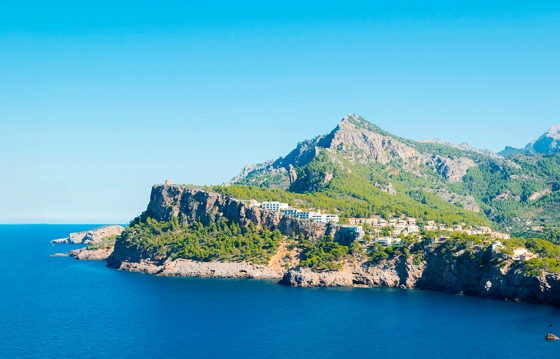Taxes on Holiday Properties in Mallorca for Non-Residents
Whether it’s a second home or a rental property for vacationers: Non-residents in the Balearic Islands must submit income tax returns.
A holiday home in Mallorca is not only a financially but also an emotionally rewarding investment. However, for non-residents in Spain—i.e., individuals who have their primary residence abroad and own a holiday property in the Balearic Islands—the tax authorities have specific requirements. Depending on the use of the dream house on the island, different income tax returns must be submitted, even if no rental income is generated from the property.
The tax treatment is based on the Spanish Income Tax Law for Non-Residents (Impuesto sobre la Renta de no Residentes – IRNR). Here are two important points:
- Own Tax Law: Spain has a special law for taxing non-residents, which differs from regulations in many other countries.
- Self-assessment: In Spain, taxes must be calculated and paid independently under the “self-assessment” system. Unlike in Germany, the taxpayer does not receive a tax assessment notice. Whether everything has been done correctly is only known during an audit.
Different tax regulations apply depending on how the property is used. Below, we focus on self-use and holiday rentals.

1. Use Exclusively for Personal Residential Purposes
Anyone who has fulfilled their dream of owning a home in Mallorca and is still registered abroad must deal with the Spanish self-use tax. This is a type of second home tax.
Principle of Self-Use Tax:
In Spain, the mere availability of the property is taxed. Every second home is therefore automatically subject to self-use taxation. This affects both residents and non-residents. The latter must submit a separate declaration for each property.
Calculation of the Tax:
The tax is based on the cadastral value of the property, which is set by the municipality and should not be confused with the market value. Based on this cadastral value, a notional income is calculated, which amounts to 1.1% or 2%, depending on the timing of the last update of the cadastral value. This notional income is taxed at a rate of 19% for EU citizens and 24% for non-EU citizens. Example: For a cadastral value of 200,000 euros, the tax is about 760 euros per year with a 2% valuation and a 19% tax rate.
When Does the Tax Apply?
The tax is due as soon as the property is habitable—regardless of whether it is actually used. New constructions are considered habitable from the time of final approval. For renovations, it is crucial whether the property remains habitable during the work. Extensive renovation work should be documented to prove possible uninhabitability. The deadline for submitting the declaration (“Modelo 210”) runs throughout the following year.

2. Rental to Different Holiday Guests
Here, the difference between VAT-liable and VAT-exempt holiday rentals must be noted.
Holiday Rentals with VAT Liability:
VAT-liable holiday rentals constitute a commercial activity if services are offered to guests that are typical in the hospitality industry. These include reception services, ongoing support, regular cleaning, linen changes, luggage storage, catering, etc. The income is subject to VAT (IVA) of 10%, which is paid quarterly to the tax authorities after deducting input tax (“Modelo 303”). An annual VAT return (“Modelo 390”) is also required. From a Spanish perspective, this type of rental establishes a permanent establishment, so profit determination follows the rules of the Corporate Income Tax Law, with three interim payments and final taxation via the corporate tax form (“Modelo 200”), in the same way and under the same rules as a Spanish company. A 25% corporate tax is due on the profit.
Holiday Rentals without VAT Liability:
Without VAT-liable services, the rental is considered residential leasing for tax purposes, even though holiday rentals may be differently defined under the civil tourism law of the respective region. However, invoices from intermediary agencies may result in an obligation to pay VAT The Non-Resident Income Tax Return (Modelo 210) must be submitted between January 1st and 20th of the following year (by January 15th if payment is to be made by direct debit). The tax is 19% on the profit for EU citizens, with certain restrictions on deductible expenses and depreciation. For periods when the property was not rented out, self-use tax is due, which must be declared separately.
To ensure that you are well-informed when purchasing your holiday property in Mallorca, it is crucial to seek advice from local experts who specialize in all relevant areas. In this context, we recommend the advisory services of PlattesGroup, who work closely with the financial experts at Lionsgate Capital. They assist their clients in optimizing investments in Spain, thanks to their extensive experience and services in the Balearic Islands and across the country.


Article by Christian Plattes
Asesor Fiscal (Spanish tax advisor) and head of the “Wohn- und Ferienvermietung”
Christian Plattes is an Asesor Fiscal (Spanish tax advisor) and head of the “Wohn- und Ferienvermietung” (Residential and Holiday Rental) Center of Excellence at PlattesGroup (https://link.plattes.net/lionsgateblog), a business, tax, and legal advisory firm based in Palma de Mallorca. The company has a team of over 100 professionals and focuses on advising German-speaking individuals and companies with interests in Spain, particularly in the Balearic Islands. For more information, listen to the podcast with Christian Plattes.



